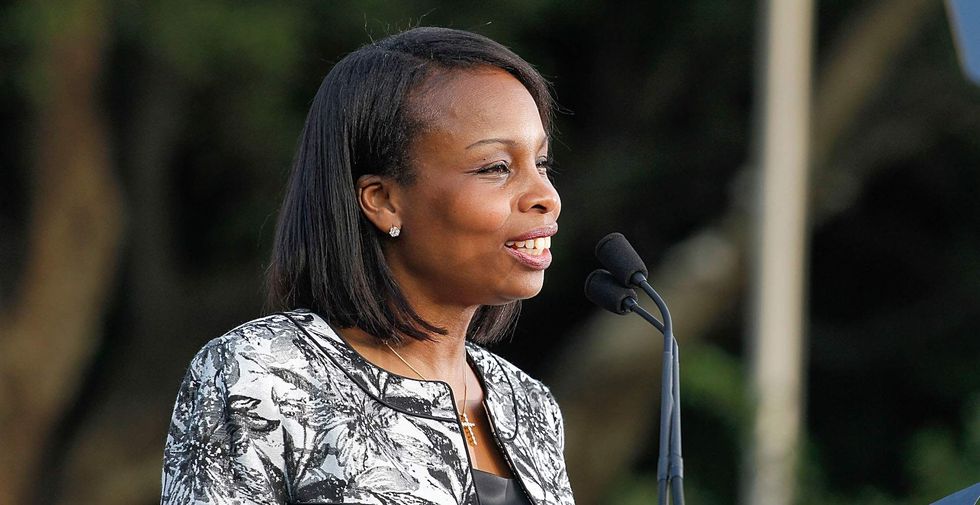
San Antonio Mayor Ivy Taylor (D) has faced backlash from progressive outlets for saying a lack of faith in God is one of the “deepest systemic causes” of poverty in her city. (Rick Kern/Getty Images for HISTORY)

The mayor of San Antonio didn’t say atheism leads to poverty, despite several media reports characterizing her recent comments that way.
During a candidate’s forum earlier this month, Mayor Ivy Taylor, a Democrat, was asked by the SA Christian Hope Resource Center, a charity working to make individuals financially self-sustaining, what she believes are the “deepest systemic causes of generational poverty” in San Antonio.
In response, Taylor shared her faith in God and her belief that, without God, people are “broken.”
“Since you’re with the Christian Coalition, I’ll go ahead and put it out there that to me, it’s broken people,” the mayor said. “People not being in a relationship with their Creator and therefore, not being in a good relationship with their families and their communities and not being productive members of society.
“I think that’s the ultimate answer,” she added, later saying she tries to “be an example” to those around her.
As mayor, though, Taylor said that’s “not something I work on.”
And despite the numerous reports on her comments, very few covered the practical issues she addressed next.
“I see education as the great equalizer,” she said. “And so, for a variety of reasons — you know, wanna talk about school districts, or economic segregation — we just have not provided the same opportunities for people to have access to high-quality education that puts them on the path for careers in every single part of San Antonio.
“I see that as being one of the systemic causes,” she continued.
Teen pregnancy, the mayor argued, is also an issue that leads to poverty.
“And that kind of goes hand-in-hand with education because when people are parenting early,” Taylor said, “that usually means they don’t have the opportunity to complete their education, so it ends up being a vicious cycle.”
However, the Democrat said she’s received some pushback from those who characterize the issue of teen pregnancy as a moral or religious one. Taylor said she’s “tried to frame it as an economic development issue” because those who cannot complete their education are generally underemployed or unemployed.
Later in the discussion, Taylor opened up more about her faith: “I am a born again Christian, a believer in Jesus Christ. I draw very heavily on that as far as the strength to do this job.”
She went on to say she relies on Philippians 4:13 “on a daily basis.” The passage reads, “For I can do everything through Christ, who gives me strength.”
Interestingly, the next candidate to answer the question, City Councilman Ron Nirenberg, offered an equally philosophical answer to the problem of poverty, though he didn’t invoke God.
“If I had to point to one cause philosophically,” said Nirenberg, who is politically unaffiliated, “it would be the loss of ‘the public common,’ the sense that we’re all in this together. And that has resulted in people doing a lot of things — or not doing a lot of things.”
“Such as participating in the local elections, such as reading a newspaper, such as doing whatever it is to help a neighborhood association. There’s a loss of the sense of a common ground, a common purpose for people throughout this city and throughout this community,” he continued, describing the situation as “a plague on us all.”
His comments, however, were not scrutinized in the same way Taylor’s were. The Huffington Post said Taylor suggested people “without God cause poverty” and the Progressive Secular Humanist, a blogger at Patheos, wrote: “San Antonio Mayor Says Atheism Causes Poverty.”
None of those reports are entirely accurate, though that’s not surprising. Last year, New York Times editor Dean Baquet admitted the newspaper is out of touch with religion.
“We don’t get religion. We don’t get the role of religion in people’s lives,” he said. “And I think we can do much, much better. And I think there are things that we can be more creative about to understand the country.”
In response to the backlash she’s received from the incomplete media reports on her comments, Taylor told KENS-TV that many of the stories are “dishonest, politically motivated, and intentionally edited.”
Here’s Taylor’s full response:
The video clip that surfaced on social media this weekend is a dishonest, politically motivated misrepresentation of my record on combatting poverty. It was intentionally edited to mislead viewers.I have devoted my life to breaking the chains of generational poverty — as an urban planner, the District 2 councilwoman, and now mayor. I’ve done so because of my faith in God and my belief in Jesus’s ministry on Earth. I believe we are all called on to help lift our brothers and sisters out of poverty.
The video was edited to cut out the rest of my answer — what I’ve done as mayor to help alleviate poverty in San Antonio. That includes taking on teen pregnancy and our high-school dropout rates, advocating job-training for young people who aren’t college-bound, and fighting crime.
You can see the mayor’s full answer during the forum at the 1:07:45 in the video below.